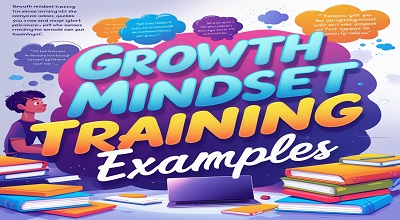Growth Mindset Training
Growth Mindset Training: In today’s fast-paced world, personal and professional development is crucial for success. One of the most powerful concepts driving this development is the growth mindset. Coined by psychologist Carol Dweck, a growth mindset is the belief that abilities and intelligence can be developed through dedication, hard work, and learning.
At TeacherEducator.com, we understand the importance of fostering a growth mindset in educators and students alike. This comprehensive guide will explore growth mindset training, provide real-world examples, and offer actionable strategies to cultivate this mindset in various settings.
Understanding Growth Mindset vs. Fixed Mindset
Definition and Key Differences
A growth mindset is the belief that intelligence and skills can be developed through effort, learning, and persistence. In contrast, a fixed mindset assumes that abilities are static and unchangeable.
| Aspect | Growth Mindset | Fixed Mindset |
|---|---|---|
| Challenges | Embraces challenges as opportunities | Avoids challenges due to fear of failure |
| Effort | Views effort as a path to mastery | Sees effort as pointless if not naturally talented |
| Feedback | Learns from criticism | Ignores or resents criticism |
| Success of Others | Finds inspiration in others’ success | Feels threatened by others’ success |
Psychological Foundations
Carol Dweck’s research highlights how mindset shapes motivation and achievement. Studies show that students with a growth mindset outperform those with fixed beliefs because they persist despite difficulties.
Why Growth Mindset Training Matters?
Benefits in Education
- Improved Academic Performance: Students who believe in growth show higher resilience and problem-solving skills.
- Increased Engagement: A growth mindset fosters curiosity and a love for learning.
Impact on Professional Growth
- Adaptability in the Workplace: Employees with a growth mindset embrace change and upskilling.
- Leadership Development: Leaders who model a growth mindset inspire innovation.
Key Principles of Growth Mindset Training
Embracing Challenges
Example: A student struggling with math says, “I haven’t mastered this yet, but I will keep trying.”
Learning from Criticism
Example: A manager receives feedback and responds, “How can I improve based on this input?”
Persistence in the Face of Setbacks
Example: An entrepreneur fails but says, “This is a learning opportunity for my next venture.”
Effective Growth Mindset Training Techniques
Reframing Negative Thoughts
- Fixed: “I’m bad at public speaking.”
- Growth: “I can improve my public speaking with practice.”
Encouraging Effort Over Talent
Praise: “You worked hard on this project!” instead of “You’re so smart!”
Using Growth-Oriented Language
- Instead of: “I can’t do this.”
- Say: “I can’t do this YET.”
Real-World Examples of Growth Mindset in Action
Classroom Applications
- Example: A teacher uses “mistake journals” where students reflect on errors and lessons learned.
Corporate Training Success Stories
- Microsoft’s Growth Mindset Culture: Employees are encouraged to take risks and learn from failures.
Latest Trends in Growth Mindset Training (2024-2025)
AI and Personalized Learning
- Adaptive learning platforms tailor challenges based on individual progress.
Gamification Techniques
- Badges and rewards for effort (not just outcomes) motivate continuous improvement.
How to Implement Growth Mindset Training in Schools?
Teacher Training Programs
- Workshops on fostering a growth mindset in students.
Student Engagement Strategies
- Growth mindset posters, reflection exercises, and peer mentoring.
Growth Mindset in Leadership and Organizations
Developing Resilient Teams
- Google’s “Psychological Safety” model encourages risk-taking without fear of judgment.
Case Studies from Top Companies
- Amazon’s “Fail Fast” Approach: Encourages experimentation and learning from mistakes.
Common Misconceptions About Growth Mindset
Myth: “It’s Just About Positive Thinking”
- Reality: It’s about strategic effort, not blind optimism.
Myth: “Everyone Can Achieve Anything with Effort Alone”
- Reality: Effort must be focused and informed by feedback.
FAQs on Growth Mindset Training
How long does it take to develop a growth mindset?
- It varies, but consistent practice over 3-6 months can lead to noticeable changes.
Can adults change from a fixed to a growth mindset?
- Yes! Neuroplasticity shows that the brain can rewire itself at any age.
Conclusion & Key Takeaways
- A growth mindset is essential for lifelong learning and success.
- Training involves reframing challenges, embracing effort, and learning from feedback.
- Schools and workplaces benefit from fostering this mindset in students and employees.
